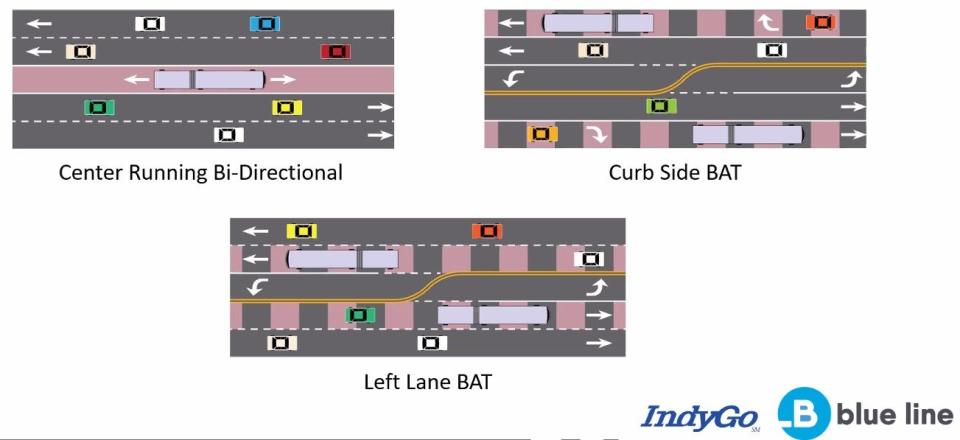A compromise over bus lanes on Washington Street floated, then quickly tabled
Indiana lawmakers briefly floated a proposal to alter IndyGo's plans for dedicated bus lanes on a section of Washington Street in exchange for dropping state-imposed revenue requirements on the transit agency.
But after a lengthy discussion in the House Ways and Means committee over the technical makeup of the proposal and its ramifications, a narrow majority of committee members voted to table it.
The proposal was an amendment tacked onto an education bill, Senate Bill 290, which advanced out of the education committee on Feb. 17 but came to Ways and Means for several amendments.
The amendment, authored by Rep. Chuck Goodrich of Noblesville, offered a carrot, rather than a stick, approach to altering the design of future dedicated bus lanes on Washington Street, where the city's third bus rapid transit route, the Blue Line, is planned.
IndyGo CEO Inez Evans: On legislative challenges, the Purple Line and what's ahead in 2022
It would have rolled back unique funding requirements placed on IndyGo in 2014 when bus rapid transit lines were approved, if IndyGo certifies to the city-county government that the Blue Line or "any other project substantially similar" is complete, operational, and abides by the following requirements:
On a two-and-a-half mile stretch of West Washington Street between Holt and High School roads, maintain at least two lanes of general purpose traffic in each direction, and have one bidirectional bus rapid transit lane
On a two-mile stretch of East Washington Street between Sherman Drive and Arlington Avenue, which runs through Irvington, maintain at least two lanes of general purpose traffic in each direction.
On Monday, the Ways and Means committee struck that latter requirement, which had drawn several Irvington-area transit advocates to the committee room, before tabling the entire amendment.
The amendment did not require IndyGo to do this redesign; if IndyGo decides not to, then its revenue requirements will remain intact. State law requires IndyGo to raise 10% of a project's annual operating costs from "sources other than taxes and fares," and 25% of a project's annual operating costs from fares.
Briggs: The forever war on IndyGo is fizzling
Senate Bill 290 is a laundry list of education proposals, including the establishment of a career coaching pilot grant program for schools, public meeting requirements before hiring a superintendent, requirements on reporting high school graduation waiver rates, and more.
After the Ways and Means committee issues its report, the bill can head to the floor for a second reading and hear amendments, potentially Wednesday.
In the current design for the 24-mile-long Blue Line, 70% of the corridor includes dedicated bus lanes in the left lanes of each side of the street, with the outer right lanes reserved for general purpose traffic. This would cut down Washington Street from four traffic lanes to two in most places. General traffic can, however, use the bus lanes to make turns.

The design process for the $220 million project is nearly 60% complete, and it is projected to open in 2027.
Though the amendment was authored by committee member Goodrich, stakeholders like IndyGo have also been discussing the issue with Rep. Bob Behning, R-Indianapolis, since last year, Behning said.
The intent, Behning said, is to find a compromise with community members who are concerned about the Blue Line's impact to traffic on Washington Street, one of the city's few east-west thoroughfares, and "get this off of our table permanently so we no longer have to debate this issue."
Central Indiana roads: How extra money from Biden's infrastructure law will be spent
IndyGo CEO Inez Evans said the transit agency, in working with Behning, has begun the process of reviewing the design of that two-mile segment of West Washington Street. Her team estimates a redesign of that segment would impact 8 business and cost $12 million in capital acquisitions. Maintaining all four lanes of general traffic in addition to a bidirectional bus lane would require more property.
Should the amendment come to pass, Evans said IndyGo is open to moving forward with that redesign and further discussions with Behning.
This is the second time IndyGo's Blue Line has been brought up in the legislature in 2022.
A previous bill, authored by Republican Senators Jack Sandlin and Mike Young, sought to ban the building of dedicated bus lanes outside Mile Square. IndyGo said this would have tanked the Blue Line, whose design includes majority dedicated lanes along the Washington Street route connecting Cumberland to the Indianapolis International Airport, and whose federal funding requires a dedicated transit component.
Senate Bill 369 never got a hearing, but Sandlin told IndyStar then that he hadn't given up on the issue.
Read: In battle over Blue Line, Irvington families speak up
Goodrich's amendment, on the other hand, would not prevent the Blue Line from materializing.
Democratic Rep. Edward Delaney of Indianapolis, who questioned whether legislators have the authority under the state constitution to invoke such a specific amendment governing a road project, made the motion to table the amendment. Chair Timothy Brown attempted to declare that motion out of order, but upon pushback, called for a voice vote, then a hand-raise vote, since the voices were too divided.
Contact IndyStar transportation reporter Kayla Dwyer at kdwyer@indystar.com or follow her on Twitter @kayla_dwyer17.
This article originally appeared on Indianapolis Star: IndyGo bill: Dedicated bus lanes provision tacked on education bill

